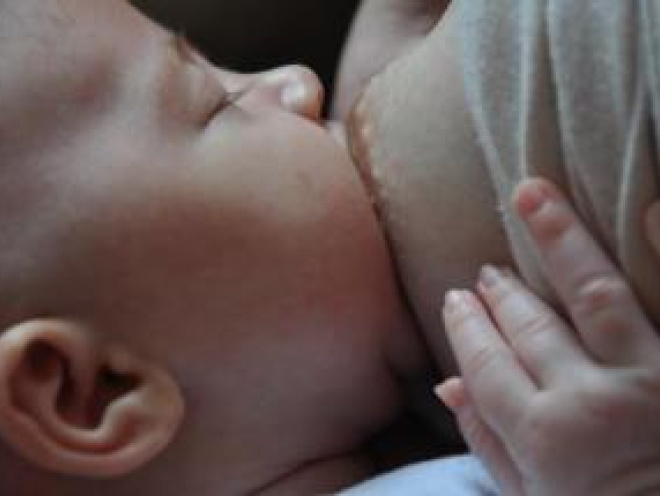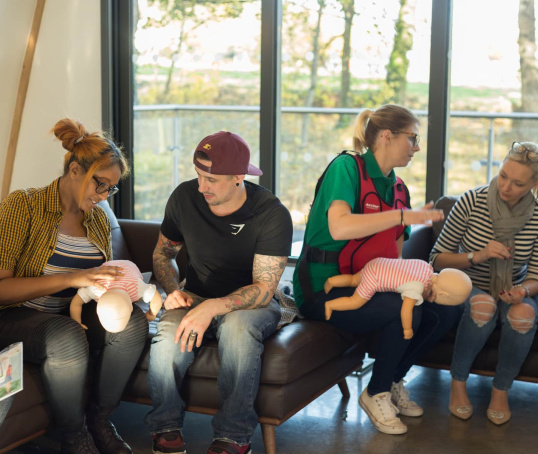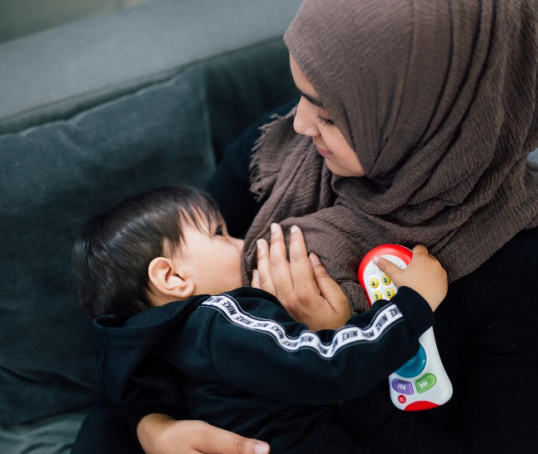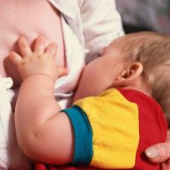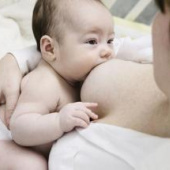What does an inflamed milk duct feel and look like? And what’s the best way to treat it? Find out everything you need to know here.
If you’re breastfeeding and you feel a small, tender lump in your breast, you might have an inflammation in your milk duct, sometimes referred to as a blocked duct. But what is it and what causes it?
What causes inflammation of a milk duct?
The glands that make milk in your breasts are divided into segments. A bit like an orange, in fact. Your milk ducts are the narrow tubes that carry milk to your nipple from each segment (NHS, 2022).
It used to be thought that there was a plug of milk blocking the tube, causing a lump in the breast tissue, but recent evidence shows it is the tissue swelling up which causes the narrowing of the ducts (Mitchell et al, 2022).
You can get an inflamed milk duct when there is an excess of milk in your breasts. The excess of milk can irritate the ducts and cause the inflammation. You may have an abundant supply of milk, especially in the first few weeks, or feeding and expressing between feeds can cause an excess of milk (Mitchell et al, 2022).
Your baby missing feeds, or if you are delaying feeds, or weaning from the breast by reducing breastfeeds, can all lead to an excess of breastmilk for a short period of time (Mitchell et al, 2022).
Sometimes a blocked milk duct can happen if your breast tissue is irritated for other reasons. This might be something putting pressure on the breast or that has bruised it; for example, a tight bra or tight clothing, bag strap, seat belt, baby carrier; rigorous massage of the breast or an awkward sleeping position where you’re putting weight onto your breast (NHS, 2022).
Symptoms of an inflamed milk duct
An inflamed and narrowing milk duct will cause the area of the breast to feel hard and painful. Depending on your skin tone, it might also be red or darker, warm to the touch and slightly tender (NHS, 2022). When your baby feeds on the side of the narrowed duct, they might fuss because they’re getting your milk more slowly than usual. There may be some temporary relief after the baby has fed and the pressure has been reduced on the duct.
Reducing the inflammation of the duct prevents it from developing into a more widespread inflammation of the breast tissue which is known as mastitis (NHS, 2022).
Treatment for an inflamed milk duct
Previous advice suggested massage, increasing the number of times a baby feeds or expressing on top of feeding would help clear what was believed to be a blockage from the milk. However, recent research shows that increasing the amount of milk taken from the breast will increase the mother’s breastmilk supply and may cause an increase in the inflammation (Mitchell et al, 2022).
Current evidence suggests the following is more effective:
- Carry on breastfeeding/expressing in response to your baby’s needs.
- Reduce any extra expressing that you are doing until the inflammation subsides.
- Rest as much as possible and stay hydrated.
- You can take paracetamol or ibuprofen while breastfeeding. If you’re taking other medicines, do check with a pharmacist. Aspirin should not be taken by women who are breastfeeding. Apply a cold cloth or cool gel pack after feeds to reduce the inflammation.
- If you were thinking of stopping breastfeeding, you might decide to wait until the inflammation reduces and then drop feeds gradually after that.
- Avoid nipple shields unless essential for feeding your baby. If using nipple shields seek support from a breastfeeding counsellor to use them without causing further issues.
- You may wish to explore how your baby is feeding with a Breastfeeding Counsellor to identify ways to eliminate risk factors. (NHS, 2022; Mitchell et al, 2022).
Contact your nearest breastfeeding support group, or our Infant Feeding support line on 0300 330 0700. It’s open between 8am and midnight.
In general:
If the inflammation has not cleared after 12-24 hours or symptoms worsen (e.g. a fever and flu-like symptoms), you could go and see your GP (NHS, 2022).
Milk blisters or blebs
Sometimes, a blocked duct is associated with a bleb or blister on the end of the nipple. Milk blisters or blebs look like a flat patch of white on the nipple and some women find them very painful (Mohrbacher, 2020).
Previously it has been recommended that milk blisters be removed by gently rubbing them or by removing a thin layer of skin blocking one of the nipple openings. However, current evidence suggests this could exacerbate the inflammation of the breast tissue (Mitchell et al, 2022).
The current recommendation is sunflower or soya lecithin capsules, 5-10g daily, and applying hydrocortisone 1% cream to reduce inflammation. This is safe with breastfeeding and can be wiped off with a tissue or towel before feeding your baby (Mitchell et al, 2022). You can buy both of these over the counter from your pharmacy or health food shop.
Mastitis symptoms
If a blocked milk duct is not cleared, it can lead to mastitis (NHS, 2022). Mastitis is a common condition that causes inflammation and pain in the breast. It’s most common in the first three months after birth but it can happen anytime (NHS, Start for Life, no date).
Symptoms of mastitis may include:
- A swollen, red or darker area (depending on skin colour), usually on one breast, that can feel hot and painful when you touch it.
- A breast lump or a hard area.
- Flu-like symptoms, such as aches, a fever, chills or tiredness.
- A burning or radiating pain in your breast.
- Nipple discharge, either white or with streaks of blood.
(NHS, 2023)
As well as trying the above suggestions, your GP might prescribe antibiotics (Mitchell et al, 2022). For more information on continuing to breastfeed with, and treating, mastitis, take a look at this article.
This page was last reviewed in July 2023
Further information
For support with feeding your baby, call the NCT support line. It's open 8am to midnight, every day of the year: 0300 330 0700
You could read Sarah Oakley’s parent-friendly explanation of ‘The Mastitis Spectrum’
We support all parents, however they feed their baby. If you have questions, concerns or need support, you can speak to a breastfeeding counsellor by calling our support line on 0300 330 0700, whether you are exclusively breastfeeding or using formula milk. Breastfeeding counsellors have had extensive training, will listen without judging or criticising and will offer relevant information and suggestions. You can also find more useful articles here.
You might find attending one of our NCT New Baby courses helpful as they give you the opportunity to explore different approaches to important parenting issues with a qualified group leader and other new parents in your area.
Make friends with other parents-to-be and new parents in your local area for support and friendship by seeing what NCT activities are happening nearby.
National Breastfeeding Line (government funded): 0300 100 021.
Mitchell, K. B. et al (2022) ‘Academy of Breastfeeding Medicine Clinical Protocol #36: The Mastitis Spectrum, Revised 2022’, Breastfeeding medicine, 17(5) pp. 360-376 from: https://www.bfmed.org/protocols [Accessed 28 June 23].
Mohrbacher N. (2020) Breastfeeding Answers. 2nd ed. Nancy Mohrbacher Solutions Inc : Arlington, Illinois
NHS Start for Life (no date) Mastitis. Available from: https://www.nhs.uk/start-for-life/baby/feeding-your-baby/breastfeeding/breastfeeding-challenges/mastitis/ [Accessed 28th June 2023]
NHS. (2022) Breast pain and breastfeeding. Available from: https://www.nhs.uk/conditions/pregnancy-and-baby/breast-pain-and-breast… [Accessed 26 Jun 23].
NHS. (2023) Mastitis. Available from: https://www.nhs.uk/conditions/mastitis/ [Accessed 13th June 2023].
